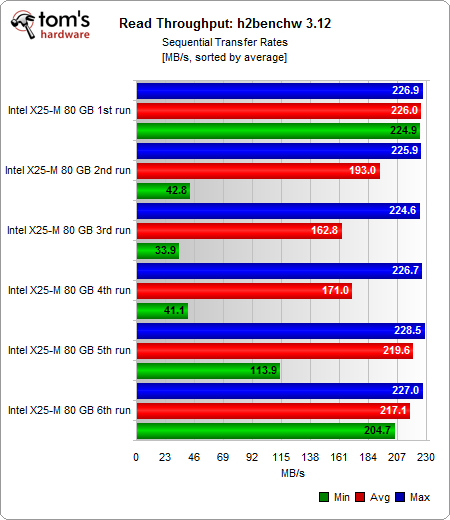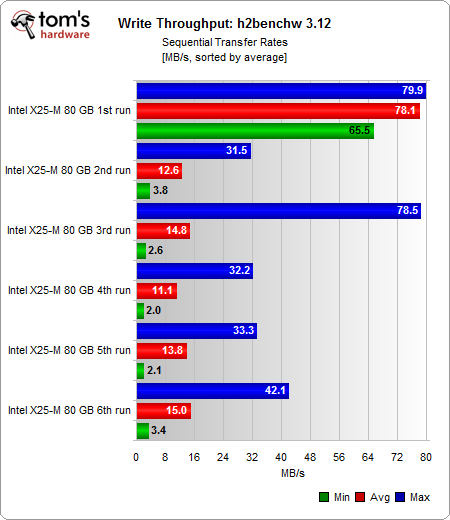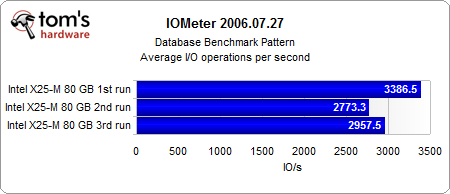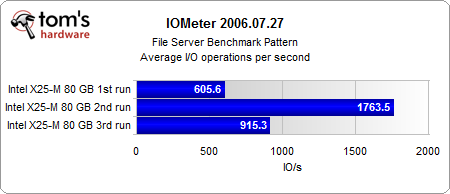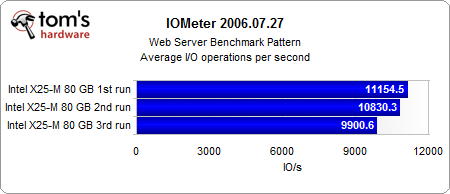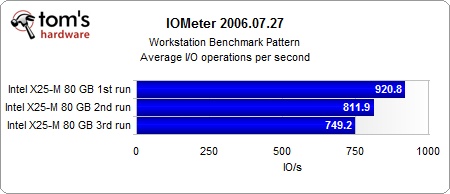The SSD Workload Performance Analysis
Intel X25-M Mainstream Flash SSD (80 GB)
Throughput Testing
Remember the test procedure: the first three runs consist of throughput testing, followed by I/O testing (you'll find the I/O results below), while the last three runs were only about throughput. Clearly, the minimum read throughput crashed from 224.9 MB/s to as little as 42.8 MB/s when we executed the IOMeter benchmark on the X25-M.
On the third cycle, the performance dropped even more, and it took until the 6th cycle for throughput to recover. Clearly the X25-M with the initial 8160 firmware takes quite a performance hit. Throughput may still reach the maximum, but it crashed to only 33.9 MB/s minimum during a h2benchw throughput test.
While read performance was still okay due to constant high maximum and average results, the sequential write performance results were really horrible. When we only execute one full IOMeter cycle, the sequential write throughput drops from 65-80 MB/s to only 3.1-3.8 MB/s. Although the maximum write throughput recovers a bit, the minimum numbers remain at an extremely low level of only 2.0-3.8 MB/s, which is far less than a conventional hard drive can provide as minimum. Even the average results are disappointing.
At this point we have to mention Intel’s 8820 firmware update, which introduces a significant performance over these results.
I/O Testing
While the throughput numbers suffer significantly with every I/O benchmark cycle, the I/O performance remains at a rather high level in the case of the database benchmark. Still, there is a noticeable drop that recovers a bit in the third run.
Get Tom's Hardware's best news and in-depth reviews, straight to your inbox.
The results are different for the fileserver benchmark pattern, which reads and writes much larger blocks than the database benchmark. Here, I/O performance increases from 605 to 1,763 I/O operations per second after the first run, and reaches 915 I/O operations per second in the third run. Clearly, the intensive throughput benchmarking seems to have a positive effect on this I/O benchmark pattern. Still, a performance increase of 2.9x followed by a 50% drop isn’t really what you would consider ideal.
Web server performance doesn’t suffer much from our torture test cycles, as it is based 100% on reading small random blocks, which flash SSDs can handle very well at all times. Still, I/O performance decreases from 11,154 to 9,000 I/O operations per second, which represents a 20% drop.
Workstation performance also decreases, but not dramatically. Let’s look at the results with Intel’s new 8820 firmware now.
Current page: Intel X25-M Mainstream Flash SSD (80 GB)
Prev Page Test Setup And Test Procedure Next Page Intel X25-M Mainstream Flash SSD With Firmware Update